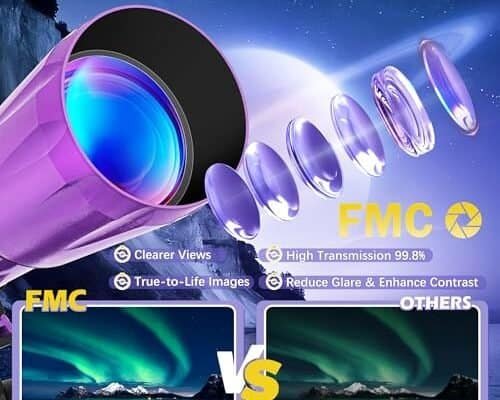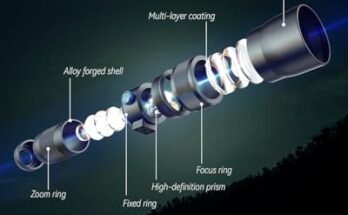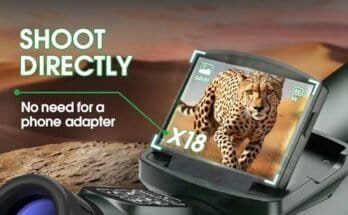The best telescope for stargazing balances aperture, stability, and simple setup for crisp views.
I remember squinting at the Moon through a shaky scope and wishing it looked sharper. If you’ve felt that too, you want the best telescope for stargazing that sets up fast, shows bright detail, and works with your phone. I tested beginner-friendly refractors and a compact monocular to see which ones truly help you spot the Moon’s craters, Saturn’s rings, Jupiter’s bands, and bright nebulae. Here are the models that gave me the most wow for the money, with clear pros and cons so you can pick your best telescope for stargazing without guesswork.
Telescope 70mm Refractor (15X-150X) Portable
This 70mm refractor hits that sweet spot for new stargazers. The wider 70mm aperture gathers enough light to make the Moon’s craters pop and show Jupiter’s Galilean moons as bright points. With 15x–150x usable magnification, I could switch from wide fields to lunar close-ups without the image turning mushy. The included phone adapter and wireless remote make it easy to snap steady photos, which is a big win if you want to share your first Moon shots. The lightweight tube and backpack-style portability make it a true grab-and-go setup.
Setup took me under 10 minutes. The alt-az mount moved smoothly, so I didn’t overshoot targets. On clear nights, this felt like the best telescope for stargazing in the under-$150 starter range because it showed more detail than smaller travel scopes while staying kid-friendly. I could split bright double stars, follow Saturn’s ring shape, and scan the Pleiades. If you want a simple scope that builds confidence fast, this one delivers reliable views and easy phone captures.
Pros
- Light, portable, and quick to set up
- 70mm aperture gives bright lunar and planetary views
- Phone adapter and remote reduce shaky photos
- Smooth alt-az controls help kids and beginners track
- Great value for first-time buyers
Cons
- Tripod is basic; windy nights can add vibration
- High power eyepiece needs steady hands and focus care
My Recommendation
Pick this if you want a light, family-friendly kit that brings quick wins. It’s the best telescope for stargazing on a tight budget and perfect for the Moon, bright planets, and star clusters from the backyard.
| Best for | Why |
|---|---|
| Beginners and kids | Simple controls and easy setup build confidence fast |
| Casual lunar/planet viewing | 70mm aperture shows crisp craters and big planets |
| Phone snapshots | Included adapter and remote reduce blur |
Gskyer 600x90mm AZ Refractor Telescope
The 90mm aperture on this AZ refractor steps up light-gathering power. I noticed brighter, higher-contrast views on Jupiter’s bands and Saturn’s rings compared to smaller scopes. The longer focal length helps with planetary detail and keeps chromatic aberration in check. If you’re searching for the best telescope for stargazing with a sharper planetary edge, this one stands out in its class. The included accessories get you observing quickly, and the slow-motion controls make centering targets smoother.
I liked how the mount balanced the tube for steady tracking at medium power. On steady nights, I could push magnification more than I could on 70–80mm models. Deep-sky objects like the Orion Nebula were more defined, especially under darker skies. For beginners who want a noticeable jump in clarity without moving to a heavy rig, this 90mm refractor feels like a smart investment that will grow with your skills.
Pros
- Bright, contrasty images from a 90mm objective
- Great for planets and the Moon with less color fringing
- Slow-motion controls aid precise tracking
- Solid step-up from 70–80mm scopes
- Good accessory pack for first nights out
Cons
- Bulkier than compact travel scopes
- Tripod may need weight or upgrade for windy nights
My Recommendation
Choose this if you want brighter planetary detail and a steadier view. It’s one of the best telescope for stargazing picks for families ready to upgrade clarity without adding complexity.
| Best for | Why |
|---|---|
| Planet watchers | 90mm aperture boosts detail and contrast |
| Intermediate beginners | Slow-motion controls improve tracking |
| Backyard deep-sky starts | More light for brighter nebulae and clusters |
80mm 600mm Portable Refractor Telescope
This 80mm refractor with fully multi-coated optics gave me crisp, bright images with minimal glare. The 600mm focal length strikes a nice balance: wide enough for star fields, long enough for lunar and planetary detail. The AZ mount, phone adapter, wireless control, and carrying bag make it a hassle-free travel kit. For many beginners, this can be the best telescope for stargazing because it pairs strong optics with true portability.
Setup was straightforward. I appreciated the smooth focusing and a tripod that felt a bit more robust than ultra-budget kits. Under suburban skies, I resolved the Moon’s major features and spotted Jupiter’s moons easily. At darker sites, the Pleiades sparkled and the Orion Nebula had shape and glow. If you want a well-rounded scope that excels at both viewing and simple phone shots, this 80mm package is an easy yes.
Pros
- 80mm aperture with fully multi-coated lenses
- Balanced focal length for wide and close views
- Travel-ready bag, adapter, and remote included
- Stable enough for moderate magnification
- Great optical value for the size
Cons
- Not as bright as a 90mm on planets
- Tripod still benefits from careful handling
My Recommendation
Get this if you want a portable, capable all-rounder. It’s the best telescope for stargazing fans who travel, camp, or need quick backyard setups with reliable views and easy phone imaging.
| Best for | Why |
|---|---|
| Travel and camping | Light kit with carrying bag and accessories |
| Balanced viewing | 600mm focal length is versatile |
| Beginner astrophotography | Phone adapter and remote simplify shots |
MEEZAA 90mm 800mm Refractor Telescope
The MEEZAA 90mm/800mm refractor impressed me with clean, high-contrast planetary views. The longer 800mm focal length makes higher magnification more manageable, so focusing on Saturn’s rings and Jupiter’s bands felt precise. Fully multi-coated optics boosted clarity, and the AZ mount with tripod stayed stable enough for detail work. This is the best telescope for stargazing when you want a serious beginner setup that leans into planets without losing wide-field fun.
Assembly was simple. The phone adapter helped me capture steady lunar shots. On steady nights, I pushed power to observe the Cassini Division hint on Saturn and clear crater shadows on the Moon. Under darker skies, I pulled more structure from Orion’s Nebula than smaller scopes could. For someone who wants a scope to grow with their skills, this 90mm refractor brings both power and polish.
Pros
- 90mm aperture with fully multi-coated optics
- 800mm focal length favors planetary detail
- Stable AZ mount and usable tripod
- Phone adapter for easy Moon shots
- Excellent step-up performance
Cons
- Bulkier to store and carry than 70–80mm kits
- Best results need careful focusing and steady air
My Recommendation
Pick this if planets are your priority. It’s the best telescope for stargazing lovers who want sharper detail, steadier tracking, and a package that feels more “pro” without becoming complex.
| Best for | Why |
|---|---|
| Planet-first viewing | Longer focal length and 90mm aperture reveal detail |
| Learning high-power use | Smoother focusing at medium-high magnification |
| Lunar photography | Phone adapter helps capture crisp shots |
Dianfan 90mm 800mm Refractor Telescope
This Dianfan 90mm/800mm refractor pairs a stainless tripod with a capable optical tube. I liked the added tripod rigidity; it reduced shake when focusing at higher power. The phone adapter and carry bag make it practical for backyard sessions and quick trips to darker sites. If you’re looking for the best telescope for stargazing that balances build quality with beginner ease, this model feels reassuring to use.
Views were bright and clean on the Moon and planets. The longer focal length helped tame color fringing and sharpen features. The stainless tripod, when kept low and tight, gave me steadier looks than many budget sets. For families and beginners who plan to observe often, this package offers durability and performance that encourage more nights under the stars.
Pros
- 90mm aperture with clear, bright images
- Stainless tripod adds stability
- Good accessory bundle and carry bag
- Beginner-friendly AZ controls
- Solid for frequent backyard use
Cons
- Heavier to move than ultra-light kits
- Tripod is stable but not premium-grade
My Recommendation
Choose this if you want sturdier hardware in a beginner package. It’s the best telescope for stargazing households that value stability and frequent viewing with clear planetary performance.
| Best for | Why |
|---|---|
| Frequent backyard observers | Sturdier tripod reduces shake and frustration |
| Families with kids | Durable setup tolerates regular use |
| Planet and Moon detail | 800mm focal length aids higher magnification |
Monocular 80×100 HD With Tripod & Adapter
This compact monocular is not a traditional telescope, but it’s a handy night-sky companion. I used it to scan the Moon, spot constellations, and locate bright planets before switching to a larger scope. The included phone adapter and mini tripod help with quick snaps. As a lightweight option, it makes sense for hikers and travelers who want something pocketable. It’s not the best telescope for stargazing in a strict sense, but it’s a great scout tool.
Optically, it’s better suited to low-to-medium power views. For true planetary detail, a 70–90mm refractor wins. But for casual Moon looks, meteor watching, and wide scans, this monocular is fun and fast. I liked using it to frame targets before aiming a bigger telescope. If you need ultra-portability and simple phone captures, this is a practical add-on to a stargazing kit.
Pros
- Ultra-portable and lightweight
- Fast setup for casual night scans
- Phone adapter for quick shots
- Great for travel, hikes, and camping
- Useful as a target finder before using a scope
Cons
- Not a replacement for a real telescope
- Limited high-power performance
My Recommendation
Get this as a compact companion, not your main rig. It’s not the best telescope for stargazing, but it’s best for quick looks, target scouting, and travel when you need tiny gear.
| Best for | Why |
|---|---|
| Travelers and hikers | Tiny, light, and fast to deploy |
| Quick lunar checks | Simple, bright low-power views |
| Scouting targets | Helps locate objects before using a big scope |
HETEKAN 90mm 1000mm Refractor Telescope
With a 90mm aperture and a longer 1000mm focal length, this refractor is tuned for higher magnification. I found it strong for lunar and planetary detail, especially on nights with steady seeing. Three eyepieces help you dial in power, and the phone adapter adds simple imaging. If you want the best telescope for stargazing that favors sharp, high-power views, this setup fits the brief.
The long focal length narrows the field a bit, but the benefit is tighter focus on planets and smaller targets. The included bag and accessories make it practical to move around, though it’s larger than 70–80mm options. For observers excited about the Moon, planets, and double stars, this scope’s optical reach pays off with satisfying clarity.
Pros
- 90mm objective with 1000mm focal length for detail
- Multiple eyepieces cover low to high power
- Phone adapter for easy captures
- Good for double stars and lunar features
- Strong planetary performance
Cons
- Larger and heavier than shorter tubes
- Narrower field at low power
My Recommendation
Pick this if you want maximum planetary detail from a beginner-friendly refractor. It’s the best telescope for stargazing when crisp, high-power views are your top goal.
| Best for | Why |
|---|---|
| Planet and Moon detail | Long focal length supports higher magnification |
| Double star splits | Sharp focus aids tight separations |
| Beginner imaging | Phone adapter simplifies sharing |
FAQs Of Best telescope for stargazing
What aperture is best for beginners?
Start with 70–90mm. You’ll see bright, sharp lunar and planetary views without heavy gear.
How much magnification do I need?
Most nights, 50x–150x is ideal. Higher power needs very steady air and a stable mount.
Can I photograph planets with these kits?
Yes. Use the phone adapter on the Moon and bright planets. Keep exposures short to reduce blur.
Do I need a motorized mount?
No. An AZ mount with smooth slow-motion controls works well for beginners.
Will I see galaxies from the city?
You’ll see the brightest ones faintly. Dark skies reveal far more detail and objects.
Final Verdict: Which Should You Buy?
If you want the best telescope for stargazing with bright, detailed views, pick a 90mm refractor. The MEEZAA 90mm 800mm offers sharp planetary performance and easy setup. On a tighter budget, the 70mm Portable Refractor is a fantastic starter. Travelers should choose the 80mm Portable Refractor for balanced performance in a compact kit.










